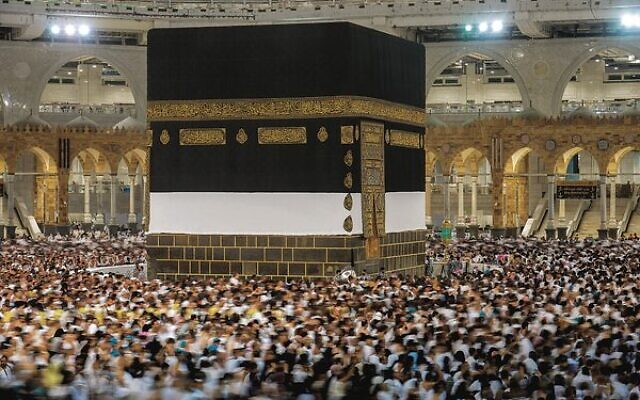Talks reportedly ‘advanced’ for direct flights to Hajj
"There is a good chance we can advance a peace agreement with Saudi Arabia," Cohen said.
Israel and Saudi Arabia are engaged in “advanced” US-brokered negotiations to enable direct flights to Jeddah, near Mecca, to help Israeli Muslims perform the Hajj pilgrimage as soon as next month, several Hebrew news outlets reported on Sunday.
The Maariv daily first reported that a breakthrough in talks was possible on Friday. Then, on Sunday, several outlets quoted a senior Israeli official estimating that there is a 60 per cent chance the move will be announced next month.
The Hajj is a once-in-a-lifetime duty for all Muslims physically and financially able to make the journey, which takes them along a path believed to be traversed by the Prophet Muhammad some 1400 years ago. This year’s pilgrimage is set to take place from June 26 to July 1.
Currently, Saudi Arabia accepts Muslim pilgrims arriving from Israel to Mecca but requires them to travel through a third country, increasing the cost of the already pricey journey. According to Maariv, 2700 Israelis embarked on the pilgrimage in 2022, and this year, the figure is expected to almost double to 4500.
In a historic move last year, Saudi Arabia announced that it opened its airspace to all civilian overflights, hours before US President Joe Biden became the first US leader to directly fly from Israel to the Gulf nation. Expectations at the time that Riyadh would also approve the Hajj flights were not realised.
On Saturday, Foreign Minister Eli Cohen touted the possibility of normalisation with Saudi Arabia within six months, during an interview with Channel 12’s Meet the Press.
“There is a good chance we can advance a peace agreement with Saudi Arabia,” Cohen said.
“I assume there is definitely a chance in half a year, or in the coming year,” he said.
Cohen cited Jerusalem and Riyadh’s joint interests, notably preventing Iran from creating a nuclear bomb, as a reason to be hopeful for a deal.
Despite the optimism for growing ties in the region, Israel’s Arab neighbours have sent other signals, expressing severe discontent with Prime Minister Benjamin Netanyahu’s new hardline government over its far-right members and antagonistic policies toward the Palestinians.
Saudi Crown Prince Mohammed bin Salman stressed his commitment to Palestinian statehood at the Arab League summit on Friday, calling it a “central issue for Arab countries, and it is at the top of the kingdom’s priorities”.
The comments were largely standard for leadership in Riyadh, which has long insisted publicly that it remains committed to the Palestinian cause and will only normalise ties with Israel after a two-state solution has been reached.
Saudi Arabia’s decision in March to renew ties with Iran after over half a decade was also seen by some as a setback for normalisation with Israel.
This has not stopped the Biden administration from working to strike a deal, with US National Security Adviser Jake Sullivan calling it a “national security interest” earlier this month.
A senior Middle East diplomat told The Times of Israel last month that the Netanyahu government has made maintaining the Abraham Accords, let alone expanding them to include Saudi Arabia, “very difficult”.
Still, Saudi Arabia has been willing to name its price for normalising with Israel in talks with Biden officials. A senior diplomat said that Riyadh has requested Washington to approve a civilian nuclear program in exchange.
The program is among several demands Riyadh has presented in talks with the Biden administration over the past year, the diplomat said, while clarifying that such a deal remains “very far off”.
Jacob Magid contributed to this report.
TIMES OF ISRAEL


comments